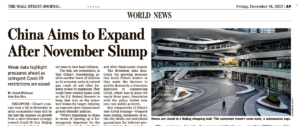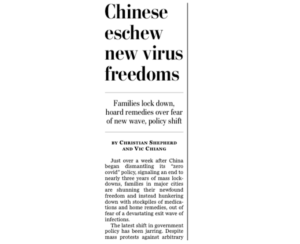President Donald Trump on Friday signed an executive order temporarily expanding the amount of beef the U.S. can import from Argentina, a move the White House says is aimed at…
As China Moves From Zero Covid, “Near-Term Economic Turbulence Could be Considerable”
Wall Street Journal writers Jason Douglas and Sha Hua reported in Friday’s paper that, “China’s economy took a hit in November in what economists hope will be the last big squeeze on growth from a zero-tolerance strategy toward Covid-19 that Beijing has since abandoned.

“Though China faces turbulent months ahead as the virus sweeps across its population, economists say the relaxation of Covid controls means the country’s economic prospects for next year have gotten an upgrade, with the sooner-than-expected reopening tipped to lift consumer spending and propel economic growth.”
The Journal article noted that,
‘What’s happening in China in terms of opening up is humongously important for the global economy,’ said Alicia Garcia-Herrero, chief economist for Asia-Pacific at investment bank Natixis in Hong Kong.
Douglas and Hua added that, “The downbeat data illustrates the growing pressure that faced China’s leaders as they made the decision to quickly dismantle a draconian approach to suppressing the coronavirus, which was in place for almost three years. Frustration with the policy boiled over into rare public protests in cities including Shanghai and Beijing.
“Key components of China’s zero Covid strategy—frequent mass testing, lockdowns of whole city blocks and centralized quarantines for infected people and their close contacts—were all scrapped in December, a policy reversal that caught both Chinese citizens and overseas investors off guard with its speed and breadth, after years where Beijing called for vigilance against the virus.
“Many economists expect the near-term turbulence in China’s economy to be considerable as the virus spreads through China’s huge population, sickening parts of the workforce and discouraging nervous consumers from spending. Sporadic restrictions may still be needed to protect China’s healthcare system from being overwhelmed.”
"The virus is really hitting all of China at once."
— Bloomberg Quicktake (@Quicktake) December 16, 2022
China’s abrupt end to Covid Zero is sparking concerns about overloaded hospitals and the possibility of another variant mutating from the surge in cases. @rachelwqchang breaks it down https://t.co/eT9pT3XYBy pic.twitter.com/pWXRXAvJ2F
The Journal article explained that, “How quickly and enthusiastically Chinese consumers start spending again will shape China’s recovery, economists say. The usual drivers of Chinese growth—investment and exports—are hobbled by a continuing real estate slump and fading Western demand for Chinese goods, putting the onus on households to do the economic heavy lifting.”
“Still, some economists are nudging up their forecasts for growth in 2023 thanks to the faster-than-expected lifting of Covid control measures,” the Journal writers said.
Also in Friday’s Wall Street Journal, Keith Zhai reported that, “The Chinese government is shifting back to growth mode, as a rapid deterioration in economic conditions prompts alarmed officials to turn more of their focus to development after years of criticizing cadres who gave priority to growth at the expense of social stability and fiscal prudence.
“He Lifeng, who was added to the Communist Party’s top policy-making body, the Politburo, at a party conclave in October, is drafting a growth plan of more than 5% for next year, according to people familiar with the matter.
“In an internal meeting shortly after the Communist Party congress, Mr. He, as head of the National Development and Reform Commission, China’s top economic-planning body, called for policies to ease Covid controls, boost the real-estate sector and re-instill confidence among entrepreneurs, the people said.”
And Christian Shepherd and Vic Chiang reported on the front page of Saturday’s Washington Post that, “Just over a week after China began dismantling its ‘zero covid’ policy, signaling an end to nearly three years of mass lockdowns, families in major cities are shunning their newfound freedom and instead hunkering down with stockpiles of medications and home remedies, out of fear of a devastating exit wave of infections.

“The latest shift in government policy has been jarring. Despite mass protests against arbitrary and excessive zero covid restrictions in at least a dozen cities last month, few expected the government to move so fast in the opposite direction. After more than two years of strict and ubiquitous covid control, many Chinese report feeling left to fend for themselves.”
The Post article pointed out that, “Public unease has been worsened, however, because the full scale of outbreak is unclear. After the sudden removal of requirements for regular PCR testing, authorities said they were no longer able to keep track of positive tests and scrapped daily reports of asymptomatic tests. A new system of classification and reporting for covid deaths reportedly has made it harder for cases to be included.”
“To combat public unease, official propaganda has reversed course. After months of underscoring the severity of coronavirus infections to justify increasingly unpopular lockdowns, Chinese health-care experts are now trying to soothe public fears of getting sick,” the Post article said.
Dow Jones writer Kirk Maltais reported on Friday that, “The surge of Covid-19 outbreaks in China after the government pulled back from its Covid-zero enforcement is expected to keep pressure on commodities as a whole through the first quarter of 2023, said Capital Economics in a note. ‘The slowdown will be accompanied by investor risk aversion, which will further undermine commodity prices,’ said the firm. ‘However, as global activity growth starts to recover from around the second quarter, we expect improved commodity demand growth and investor risk appetite to push prices higher.”





